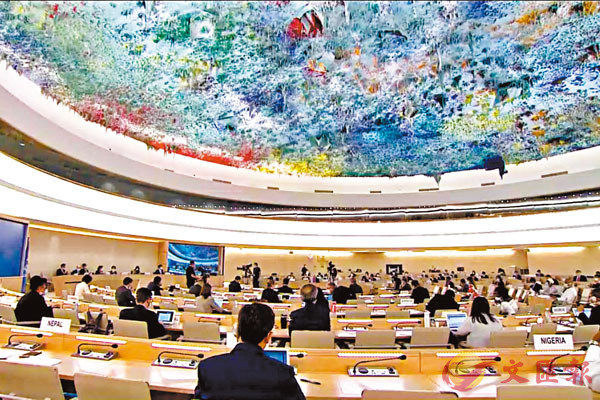 ■聯合國人權機構對美國非裔男子遭遇暴力執法後死亡事件表示「強烈譴責」。 資料圖片
■聯合國人權機構對美國非裔男子遭遇暴力執法後死亡事件表示「強烈譴責」。 資料圖片【原文】下文摘錄自香港《文匯報》6月2日報道:
聯合國人權理事會(United Nations Human Rights Council)應多個非洲成員國要求,召開緊急會議,討論種族主義(racism)議題。54個非洲國家集體提出動議,要求聯合國成立國際調查委員會(commission of inquiry),調查美國等地的「系統性種族歧視」和警察過度用武問題。事件觸動華府的神經,美國國務院(U.S. Department of State)官員表明反對議案(resolution),形容屬荒謬之舉。
國際調查委員會屬聯合國最高級別的調查,一般只在最嚴重的國際事件發生時才會成立,近年例子包括敘利亞內戰(Syrian civil war)、也門內戰(Yemeni civil war)和緬甸(Myanmar)羅興亞人危機(Rohingya crisis)等。這次也是理事會自2006年成立以來,第五次召開緊急會議。
決議案由布基納法索(Burkina Faso)代表非洲54個國家提出,會前流傳的決議草案指出,近日美國和其他地點均有和平示威,爭取非裔人士權益,但遭警方鎮壓(suppress),要求成立獨立的國際委員會進行調查,檢視美國等地的非裔人士死亡事件,是否違反國際人權法規,並找出系統性種族歧視的成因。假如議案獲通過,理事會預料會在約一年後提交報告。
美國公民自由聯盟(ACLU)等六百多個團體上周向聯合國人權理事會聯署,要求調查美國種族歧視(discrimination)風波,形容現時屬難得機會。
人權觀察組織(Human Rights Watch)主席費希爾(John Fisher)表示,美國的種族歧視和警暴問題已到臨界點,華府亦無法解決問題,「那麼國際社會便要出手。」
加州大學洛杉磯分校(University of California, Los Angeles)法律系教授、具非裔血統的阿丘梅(E. Tendayi Achiume)要求理事會採取行動,形容美國的種族歧視影響人類存亡。
美國2018年已宣布退出(withdraw)聯合國人權理事會,因此無法就決議案投票。一名美國國務院高官指出,美國政府已起訴明尼蘇達州黑人弗洛伊德(George Floyd)被跪頸致死案的4名涉事警員,審訊(interrogation)過程亦透過電視直播,認為美國的調查已具足夠透明度(transparency),批評部分國家持多重標準,美國認真審視後,才決定是否與國際調查委員會合作。
另一名美國官員亦稱,美國多年來新聞自由(press freedom)記錄良好,使世人得以知道美國的問題,並尋找解決方法,違反人權的人士也會在獨立的法院受審,批評一些參與動議的國家其身不正,「它們沒有民主自由,並隱瞞真相。」法新社(Agence France-Presse)亦引述其他西方國家官員指控,事件背後存在政治動機。
美國駐日內瓦(Geneva)聯合國大使(ambassador)布雷姆貝格(Andrew Bremberg)在人權理事會召開會議前數小時發表聲明(statement),指弗洛伊德死亡事件後,美國正落實對警隊的改革,他稱許多國家均存在種族主義問題,有關國家的政府亦應與美國及其民主夥伴一樣,展示相同水平的透明度和問責性(accountability)。
US denies potential human rights violations charged by UN
【譯文】The United Nations Human Rights Council convened an emergency meeting at the request of several African member states recently to urgently debate the issue of racism. 54 African countries collectively filed a motion urging the United Nations to set up an international commission of inquiry to investigate systemic racism and police brutality in the U.S. and other places. This issue got on the nerves of the U.S., with officials of the U.S. Department of State strongly opposing the resolution and describing it as absurd.
The international commission of inquiry is the highest-level investigation of the United Nations, and is only established in the face of the most serious international incidents, with examples in recent years being the Syrian civil war, Yemeni civil war and Rohingya crisis in Myanmar etc. It was the fifth emergency meeting since the council was founded in 2006.
The resolution was initiated by Burkina Faso on behalf of 54 countries in Africa. The draft circulated before the meeting pointed out that there had been peaceful demonstrations in the U.S. and other places worldwide to fight for the rights and interests of African people, which were unfortunately suppressed by the police.
As such, an independent international committee was required to investigate and examine the deaths of the African Americans in the U.S. and other places, and to see if violation of international human rights regulations was involved, as well as to figure out the causes of systemic racism. If the resolution is passed, the council is expected to submit a report in about a year's time.
More than 600 groups, such as the American Civil Liberties Union (ACLU), jointly submitted a request to the United Nations Human Rights Council for investigating the storm of racial discrimination, describing that this was the most opportune moment to do so. Geneva director of Human Rights Watch John Fisher called this a moment of reckoning for the U.S., saying that if national processes in respect of racial discrimination and police violence consistently failed, "international processes are needed". E. Tendayi Achiume, a law professor of African descent at the University of California, Los Angeles, said that the council would need to take action, as racism in the U.S. was "a human rights crisis of existential proportions".
Since the U.S. announced its withdrawal from the United Nations Human Rights Council in 2018, it would not get a vote on the matter. A senior official of the U.S. Department of State pointed out that the four police officers involved over the death of the black man George Floyd had been charged by the government, and the interrogation process was also broadcasted live on TV, believing that the investigation carried out was deemed sufficiently transparent. He criticized some countries for adopting multiple standards, saying that the U.S. would decide whether to cooperate with the international commission of inquiry only after careful review.
A senior US diplomat voiced out that the country had a good track record of press freedom over the years, allowing the world to see its problems and openly engage on its efforts at finding solutions, and those who violated human rights would be tried in independent courts. "It is countries that hide the truth, and don't have democratic accountability," said the diplomat. The Agence France-Presse also cited from officials of a number of Western countries saying that the resolution was "being pushed through to advance a political agenda."
Andrew Bremberg, U.S. ambassador to the United Nations in Geneva, issued a statement hours before the meeting of the Human Rights Council, saying that the U.S. was implementing police reforms after Floyd's killing, and the issue of racial discrimination was actually faced by many countries. He called upon all governments to demonstrate the same level of transparency and accountability that the U.S. and its democratic partners practiced.■龐嘉儀
Q&A
1. 聯合國人權理事會的成立取代了哪個擁有60年歷史的組織?
2. 該理事會的總部設於哪裏?
3. 哪份法律文件協助聯合國保護人權?
4. 承上題,該文件中首份保護世界人權的文獻是什麼?
5. 有意見認為美國的種族問題可追溯至16世紀的哪種制度?
Answer
1. 聯合國人權委員會(United Nations Commission on Human Rights)
2. 瑞士日內瓦(Geneva, Switzerland)
3. 《國際人權公約》(International Bill of Human Rights)
4. 《世界人權宣言》(Universal Declaration of Human Rights)
5. 大西洋奴隸貿易(Atlantic slave trade)

